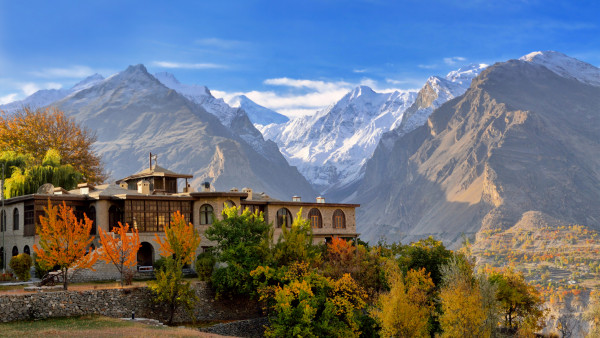Despite being largely forgotten by global travel guides, Pakistan has some of the most beautiful landscapes on earth. Such surroundings have brought forth a host of wellness retreats, which have birthed new and sustainable forms of tourism.
Art student, wellness enthusiast and blogger Shiza Saqib has recently taken to performance art to bring together her love for yoga and art.
By taping ink bottles to her ankles and fingers, Shiza – who blogs under the handle AllThatShiz – performed a series of yoga movements that ended up with an abstract art piece.
Shiza has long been a proponent of health and physical exercise but recently she has found herself completely immersed in yoga and found herself connecting more to her own wellbeing after attending a yoga retreat in northern Pakistan in 2020.
“In a country like Pakistan where there are challenges around mobility and security, being able to travel by yourself helps you rewrite rules for how you can exist within society”
Despite growing up in Pakistan, this was the first time Shiza had attended such a retreat in her country. She was inspired to go on after months of being under lockdown, with the country’s ban on international travel limiting her ability to travel abroad.
But Shiza isn’t the only one who found a newfound love for wellness in Pakistan’s stunning northern areas.
Aerial Instructor Jahan Ara, who attended an acro yoga retreat in November last year, now also shares an interest in wellness.
Pakistani women take part in a practice yoga session ahead of International Yoga Day in Lahore [Getty Images]
“While travel bans (due to COVID-19) certainly contributed to the increase in local travel, it probably also helped that wellness, including yoga, has gotten very popular recently, with the community growing and lots of new trainers coming in,” she says.
Jahan Ara’s own experience was that of a four-day immersive retreat in which the group spent time in the resort to practice their skills.
One of the reasons that Pakistan’s northern areas are so popular is because of the stunning natural beauty that the region has to offer.
The mountainous regions of Hunza and Skardu valleys are particularly popular with locals. While the increase in tourism has caused a rise in more luxury hotels and better infrastructure, Shiza believes that other reasons motivate travellers to visit.
“The industry has come to realise that not everyone is looking for luxury hotels. A big part of wellness is getting away from material luxuries, so cabins have been set up within nature like a lake or forest, to help people reconnect with nature and help nurture their mind and soul,” she says.
|
Pakistani women have long fought against cultural taboos and control over their presence in public, which makes Zenith Irfan’s achievements all the more important amidst a background of women reclaiming public spaces. https://t.co/fpGpdfrN59 — The New Arab (@The_NewArab) May 26, 2022 |
Experiences focused on building wellness allow for more immersive retreats, which more practitioners of wellness are demanding. In fact, for many groups, the mental and physical well-being of their attendees starts as early as taking registrations.
Jahan told The New Arab that, despite the many barriers to women’s public mobility and travel in Pakistan, these retreats feel much safer because many vet applicants upon registration which has helped some women feel more comfortable attending.
“In a country like Pakistan where there are challenges around mobility and security, being able to travel by yourself helps you rewrite rules for how you can exist within society,” says Jahan when talking about how these efforts can change the way women explore their identities in public.
Shiza adds that the rise in popularity of women travelling locally has created a trend. “So many women are now going on backpacking trips. It’s almost like a domino effect. Everyone wants to do it but nobody does until someone makes the first move,” she says while adding that while experiences differ, she’s been lucky enough to have good experiences when travelling in Pakistan.
“In my own experience I’ve come to realise that most locals are super hospitable, even though society paints a dark picture,” says the young art student.
As more people share their experiences online and through word of mouth, the demand for these trips continues to increase.
In fact, Dhanak Aijaz – Acro Yoga instructor and organiser of the retreat that Jahan attended – says she only chose to host the retreat after popular demand from her clients.
She points out how many people benefit from the retreats in unique ways. “I think especially for those in dark places or face depression when they come to the retreat they realise that there’s so much more to life than what they had in mind, and I think that’s the best kind of self-exploration there is,” she says.
The rise in these retreats has the potential to positively impact Pakistan’s image as a country unfit for tourism. “It would be so amazing if we can attract an international audience for these wellness retreats. I don’t really see why we can’t do that. We have beautiful spaces, qualified instructors, and a decent infrastructure. I also hope we’re able to make these spaces more inclusive,” says Jahan.
However, those who love these spaces are also wary of how sustainable the current rise in local tourism is. “Locals are able to make more buildings and there’s more income for their families as more tourists come their way. That being said, enticed by more money, they are beginning to overlook pollution. This should be something of concern,” says Dhanak.
But despite this, Dhanak is hopeful that the right measures can bring sustainable change.
“Helping Pakistan become a tourist destination will have a positive knock-on effect, leading to better infrastructure, along with better management of pollution and a building a greater sense of security. The more people start going, the more accessible it seems, leading to an increase in those willing to also go to these places,” she says.
Anmol Irfan is a freelance journalist with bylines in VICE, HUCK, and The Guardian among others. She has experience writing on minority politics, activism, and gender issues. She is also the founder of the Pakistani community platform, Perspectives Magazine.
Follow her on Twitter @anmolirfan22
Unlock the world’s wonders with unforgettable journeys tailored just for you! Whether you crave sun-kissed beaches, thrilling adventures, or rich cultural escapes, your dream destination awaits. Enjoy seamless travel with expert tips, exclusive deals, and handpicked experiences that Turn Every Trip into a lifetime memory.










